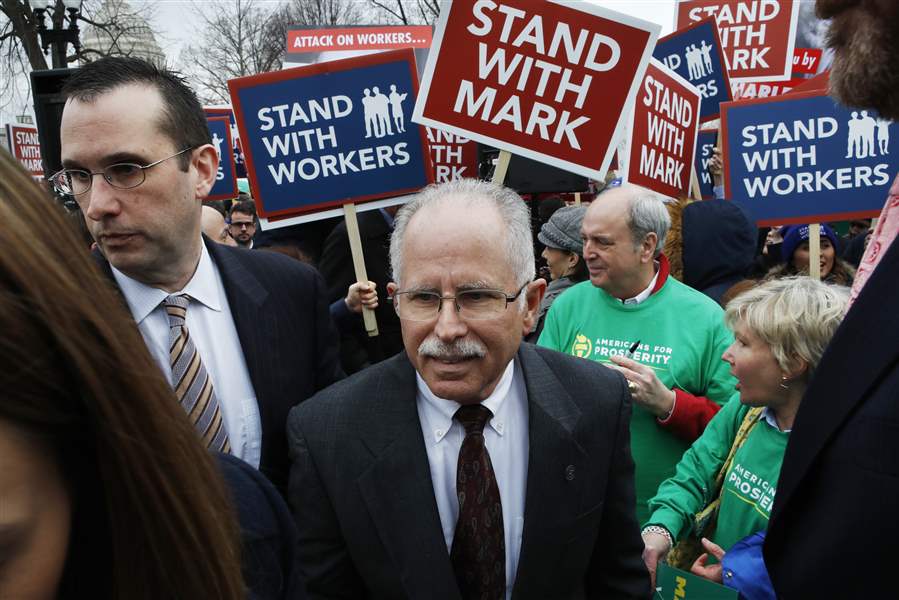
The Supreme Court should find a compromise on unions
3/2/2018
Illinois government employee Mark Janus, center, turns after thanking supporters outside the Supreme Court.
ASSOCIATED PRESS

Will Tomer
The Supreme Court will be hearing a number of cases this year that may produce important rulings on the state of free speech in the United States. A case frequently cited as a First Amendment issue — Janus vs. American Federation of State, County, and Municipal Employees — could have an outsized impact on citizens across the country.
Mark Janus, an Illinois state employee, claims that requiring non-union employees to pay a fee to the union for collective bargaining amounts to “compelled speech,” which would be a violation of the First Amendment.
Read last week’s column from Will Tomer
Mr. Janus believes that union bargaining is inherently political. By requiring that he contribute money to the union, Mr. Janus believes he is being forced to align himself with a certain strain of politics to which he does not subscribe.
“The union’s fight is not my fight,” Mr. Janus told Illinois Policy.
Unions, for their part, believe that what they negotiate for through collective bargaining — health benefits, pay raises, vacation days, maternity leave — is separate from their political activities.
Furthermore, unions do not bargain on behalf of a segment of any given workplace group, but instead for the whole workplace. In other words, Mr. Janus pays the union fee to enjoy the same benefits the union has negotiated for its members to enjoy. Unions have long maintained that if non-union members no longer had to pay a fee but still received the benefits, they would be “free riders.”
But Mr. Janus has made his disagreement clear and his case has now progressed to the Supreme Court, which heard oral arguments on the matter last week.
Standing in Mr. Janus’ way, however, is Supreme Court precedent.
In the 1977 case Abood vs. Detroit Board of Education, the Supreme Court unanimously ruled that state and local governments may require non-union employees to pay a fee to the union to assist with contract negotiations they ultimately benefit from.
The Supreme Court also ruled, in the 2007 case Davenport vs. Washington Education Association, that a union may use non-member fees for political activities, but only with the permission of the non-members. The majority opinion, written by the late and famously conversative Justice Antonin Scalia, holds that requiring fees from non-union employees for the purposes of collective bargaining was still legal.
Overturning the Abood decision was a possibility in the 2016 case of Friedrichs vs. California Teachers Association, in large part because many analysts believed that Mr. Scalia was searching for a compromise. However, as a result of the vacancy on the Supreme Court created by Mr. Scalia’s death, the case was handed back to the Court of Appeals for the Ninth Circuit.
In last Monday’s oral arguments in Mr. Janus’ case, Associate Justice Elena Kagan pointed out that overturning the precedent set by Abood would render laws in 23 states, the District of Columbia, and Puerto Rico unconstitutional. As a result, Ms. Kagan said, thousands of municipalities would have contracts invalidated, affecting as many as 10 million workers.
Ms. Kagan then asked, William Messenger, Mr. Janus’ attorney, “What would be the justification for that?” Mr. Messenger asserted that overturning what his client believes to be an erroneous decision made 41 years ago would be sufficient justification for the resulting disruption.
The case seemed to be proceeding along partisan lines. Justices John Roberts, Samuel Alito, Anthony Kennedy, and Clarence Thomas seem to favor the idea of overturning the Abood decision and putting an end to compelled union dues. Justices Kagan, Stephen Breyer, Sonia Sotomayor, and Ruth Bader Ginsburg appear to believe that the status quo should be preserved in this instance.
Then, Mr. Breyer made comments suggesting the possibility of a compromise approach, by separating union support for collective bargaining activities from the question of the financial support unions provide to political parties.
Specifically, Mr. Breyer suggested “a solution under which employees could be required to pay, but only for a narrow range of collective-bargaining duties as defined in state law, rather than for tangentially related matter,” echoing a point of view for which Mr. Scalia had expressed his support in 1991.
The appeal of Justice Breyer’s suggestion is that it protects two fundamentally important aspects of social activity.
First, it protects First Amendment rights by effectively upholding the decision in Davenport vs. Washington Education Association, thereby continuing to ensure that a union must have the permission of the contributor to use non-member fees for political activities. Compromising on First Amendment issues is generally regarded as dangerous by civil libertarians, but Mr. Breyer’s proposal to adopt a more nuanced view of union activities, under which collective bargaining and political activities are regarded separately, protects free speech and makes it much easier for civil libertarians to accept a decision reaffirming the idea that unions have the right to extract dues from non-members in order to support the collective bargaining process.
The other area of appeal is that Mr. Breyer’s approach would reinforce the Supreme Court’s support of unionization, in general, and the collective bargaining process, in particular.
Most analysts believe that the Court’s newest member, Associate Justice Neil Gorsuch, will cast the deciding vote, and it is expected that Mr. Gorsuch will support the position suggested by Mr. Breyer. If Mr. Gorsuch does indeed vote that way, it is a decision that will endear him to many conservatives as well as free speech advocates while reaffirming, at the same time, an important aspect of Mr. Scalia’s judicial legacy.
Contact Will Tomer at wtomer@theblade.com, 419-724-6404, or on Twitter @WillTomer.